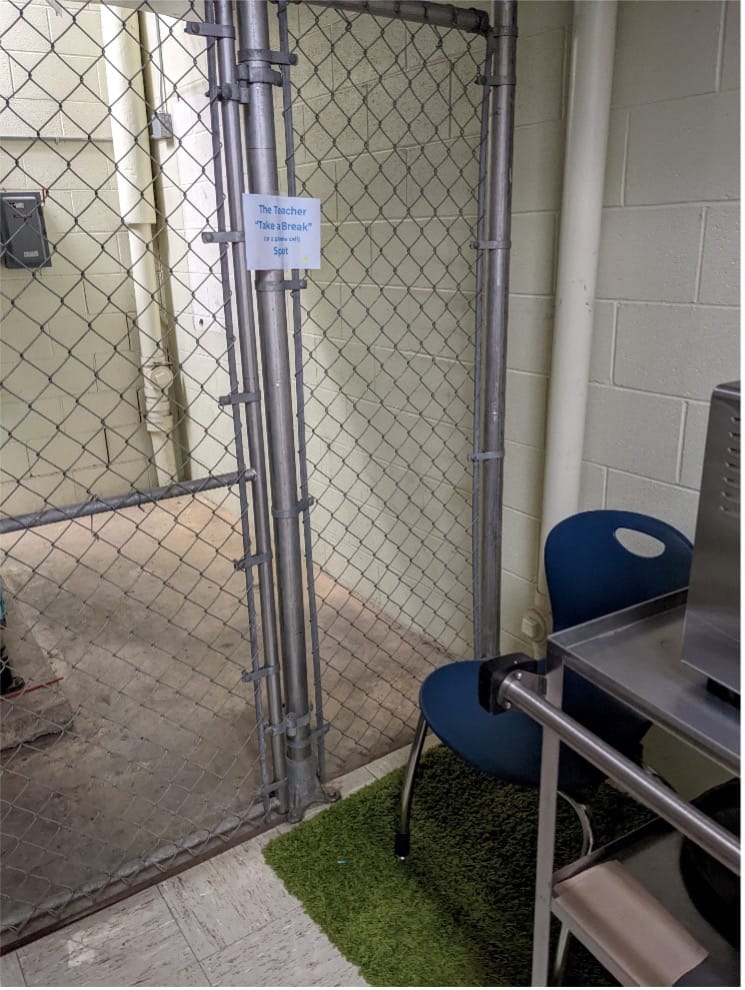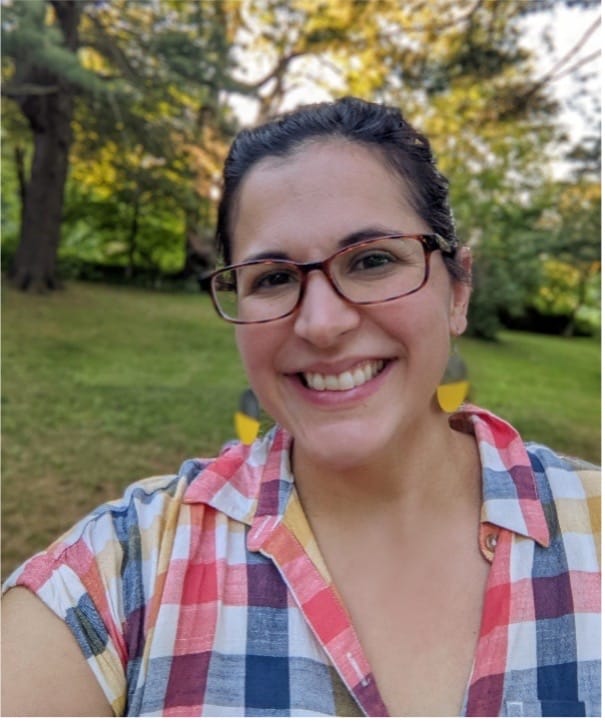A contributed perspectives piece by Melissa Weaver
When I went to help laminate at my children’s school, I didn’t expect to see a chain-link fence and a flickering florescent light.

Honestly, when I first saw the sign that read “Teacher Take a Break (or make a phone call) Spot,” I thought teachers went inside the boiler’s cage until I saw a tiny yellow arrow pointing to the little green rug and single chair tucked behind a microwave cart.
It wasn’t a stop on any educational official tour, that’s for sure. Or something most parents get to see.
As a former-teacher-turned-stay-at-home-parent, I know some of the division’s innerworkings and, also, the concerns (or lack of concern) of other parents and neighbors.
I believe especially that, after the pandemic further complicated school-home-government relationships, community members have little idea of the strain educators are under daily.
At our school, my role is to promote teacher appreciation. This year, we did an online wish list for staff requests. It was almost as depressing as the chain-link.
“…a coffee maker for our team because once the day begins, we can’t make it to the lounge for any break…a vacuum because we’re down a custodian…a spray mop because our kids each breakfast, lunch and snack in our room…supplies for a calm down space in the counseling suite…”
These and requests for supplies like headphones, glue sticks, materials for indoor recess, pencil sharpeners, hands-on literacy and math supplies filed in quickly.
We’re months into the school year.
And we recently chose a school board candidate based mostly on his legal experience helpful in a lawsuit regarding school policies.
And we have a Governor who last year created a “tip line,” for individuals to report concerns about teachers and classrooms.
Anecdotally, Marie Antoinette, when she was told that her city’s poor had no bread, famously remarked, “Well, then let them eat cake!”
“Let them eat cake!” seems to be the attitude of many toward our school systems and the actual human beings in them. Educators are starving for resources, morale, trust, rest, mental health support, leave, and even co-workers.
Instead of serving or advocating for legislation that would ease the strain, we engage in battles over books, policies and curriculum in detached and partisan ways, more invested in comment sections than in felt needs and groaning infrastructure.
In, “7 Ways Teachers Aren’t Treated Like Other Professionals,” Stephanie Jankowski writes, “Teaching is one of the few careers where the free will of others routinely and negatively impacts an employee’s livelihood.”
Jess Smith with BoredTeachers.com reminds viewers that many call teachers “superheroes.” However, superheroes usually have either exorbitant wealth or supernatural abilities, neither of which, she reminds us, educators have.
Livelihood strain plus lack of resources and finite human strength? It’s a recipe, if not for disaster, for a crumbling job sector and traumatized caring-professionals.
What we need now is less arm-chair activism/outrage and more curiosity and compassion…and, honestly, currency. Yes, caring about parental rights and curriculum has its place. Also, reading or commenting about hot-button issues gives the dopamine rush we’d get by doing something concrete. Debating policies leaves us feeling justified, accomplished and less despairing about our classrooms.
What if instead of funds pouring into watch-dog organizations, dollars were used to get staff the resources, training, and spaces they need? What if instead of trying to track down if litter boxes are truly in schools, we would track down a school employee to ask about a particular need community members could fill? What if we asked educators, not political pundits, which legislation they’d most like to see championed? What if we gave to our local Backpack Coalition to get food to students, dropped off a restaurant gift card, wrote a letter of encouragement or support, became a substitute teacher, stopped a rant about schools with gentle questions, cut lamination under a flickering fluorescent light?
As Shannan Martin says in her book, Start With Hello, “We can’t holler our way to a better world.”
May we use our hands and checkbooks and time instead of just our voices and find ways to support the dedicated professionals who are working with our kids, our chance at a better world.

Melissa Marquez Weaver is a former English/ESL teacher who lives in the Shenandoah Valley of Virginia, where she cares for her husband and three young children, more pets than they planned on, unruly gardens, and her neighborhood. She serves as co-coordinator of Christian formation with Immanuel Mennonite Church. As part of her position, she writes a blog called A Light So Lovely. Her first poetry chapbook, Welcome, Stranger: Poems of Making and Keeping Our Children, was published by Finishing Line Press in 2021, and her work has appeared in Ekstasis Magazine, The Christian Century, Bravery Magazine, Menno Snapshots, Mothers Always Write, Anabaptist Witness, The Anabaptist Journal of Australia and New Zealand and Transforming, a publication of Virginia Mennonite Missions.











